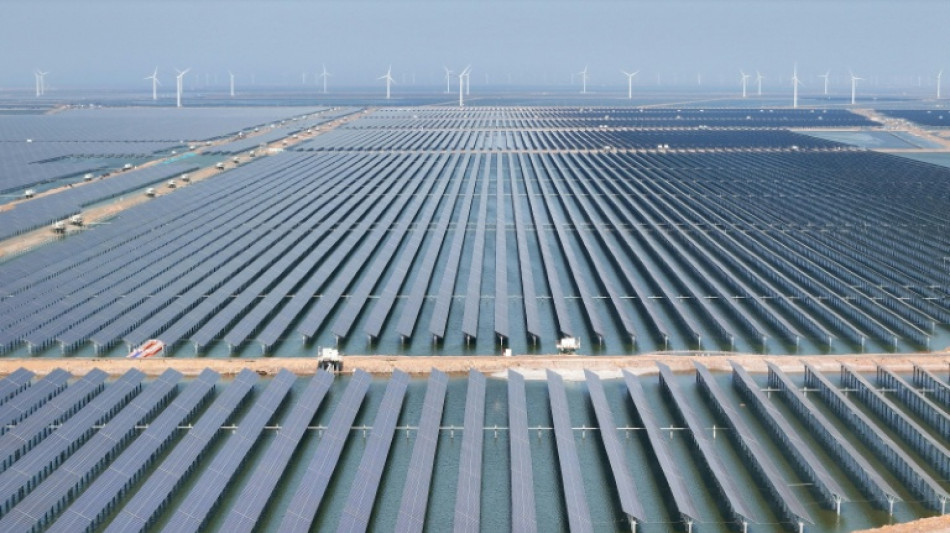
-
 More questions than answers surround Trump's TikTok deal
More questions than answers surround Trump's TikTok deal
-
Iran sanctions look set to return as last-ditch UN push fails

-
 Sitting ducks: Venezuelan fishermen wary of US warships
Sitting ducks: Venezuelan fishermen wary of US warships
-
Nissanka ton in vain as India edge Sri Lanka in Super Over

-
 An Aussie tycoon bets billions on cleaning up iron ore giant
An Aussie tycoon bets billions on cleaning up iron ore giant
-
Civil defence says 50 killed in Gaza as Netanyahu vows to 'finish job' against Hamas

-
 Canada's Corrigan leans on Olympic experience in quest for Women's Rugby World Cup gold
Canada's Corrigan leans on Olympic experience in quest for Women's Rugby World Cup gold
-
Kolisi warns 'resilient' Boks are braced for Puma mauling

-
 Fearing US invasion, Venezuela to hold emergency drills
Fearing US invasion, Venezuela to hold emergency drills
-
Greek PM warns Israel risks losing friends

-
 Pakistani PM appeals for India talks, hails Trump role
Pakistani PM appeals for India talks, hails Trump role
-
Trump aims to make America great again amid Ryder Cup woes
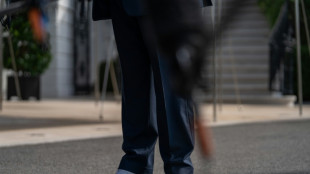
-
 Trump arrives at Ryder Cup with US seeking comeback
Trump arrives at Ryder Cup with US seeking comeback
-
Europe grabs 3-1 lead as US seeks Trump boost at Ryder Cup

-
 Lufthansa planning thousands of job cuts: sources
Lufthansa planning thousands of job cuts: sources
-
China at UN warns of return to 'Cold War mentality'
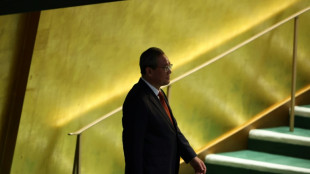
-
 England great Alphonsi expects Canada to shine in Women's Rugby World Cup final
England great Alphonsi expects Canada to shine in Women's Rugby World Cup final
-
Tottenham reject interest in reported record £4.5bn sale

-
 Man Utd boss Amorim admits uncertainty ahead of Brentford clash
Man Utd boss Amorim admits uncertainty ahead of Brentford clash
-
Zverev wins Beijing opener as Gauff launches title defence

-
 Barca duo Raphinha, Joan Garcia injured, out for PSG clash
Barca duo Raphinha, Joan Garcia injured, out for PSG clash
-
Trump hopes more opponents to be charged after 'dirty cop' Comey

-
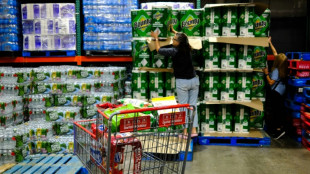 US Fed's preferred inflation gauge rises, with more cost pressures expected
US Fed's preferred inflation gauge rises, with more cost pressures expected
-
Facebook, Instagram to offer paid ad-free UK subscriptions

-
 Former UK PM Blair could lead transitional authority in Gaza: reports
Former UK PM Blair could lead transitional authority in Gaza: reports
-
Netanyahu says Palestinian state would be 'national suicide' for Israel

-
 The nations and firms threatened by Trump's pharma tariffs
The nations and firms threatened by Trump's pharma tariffs
-
Trailblazing rugby chief Griffin proud of 'incredible' strides for women's game

-
 Brother of Oasis stars denies rape, other charges
Brother of Oasis stars denies rape, other charges
-
EU steps up 'drone wall' plans after Russian incursions

-
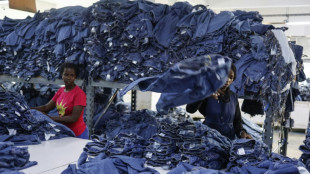 Kenyan jeans factory to fire workers as US deal expires
Kenyan jeans factory to fire workers as US deal expires
-
Arteta hails Saliba's impact as new Arsenal deal looms

-
 England's Jones channels grief in bid for Women's Rugby World Cup glory
England's Jones channels grief in bid for Women's Rugby World Cup glory
-
UN identifies 158 firms linked to Israeli settlements
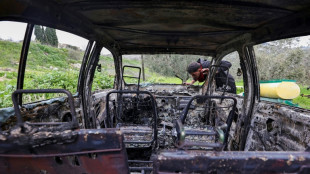
-
 Canada's Patrick Watson channels dread into new 'Uh Oh' album
Canada's Patrick Watson channels dread into new 'Uh Oh' album
-
Trump brands indicted opponent Comey a 'dirty cop'

-
 Walker an all-time great, says Guardiola ahead of Man City return
Walker an all-time great, says Guardiola ahead of Man City return
-
Alonso warns against overconfidence before Madrid derby

-
 Fritz says path to Grand Slam glory goes through Alcaraz, Sinner
Fritz says path to Grand Slam glory goes through Alcaraz, Sinner
-
UK court drops terror case against Kneecap rapper

-
 UK's Starmer urges liberals to fight 'the lies' told by far right
UK's Starmer urges liberals to fight 'the lies' told by far right
-
Bagnaia and Pennetta among first Winter Olympic torch carriers: organisers

-
 Sarkozy conviction exposes political divide in crisis-hit France
Sarkozy conviction exposes political divide in crisis-hit France
-
Ryder Cup begins in electric atmosphere at Bethpage Black

-
 UK to launch digital ID scheme to curb illegal migration
UK to launch digital ID scheme to curb illegal migration
-
Chelsea's Palmer sidelined with groin injury

-
 India retires Soviet fighter jet after six decades
India retires Soviet fighter jet after six decades
-
Slovak parliament approves anti-LGBTQ constitutional change

-
 Train tragedy hunger striker captures hearts in Greece
Train tragedy hunger striker captures hearts in Greece
-
I.Coast historic beachside town boasts new modern art museum


Energy transition: how coal mines could go solar
Disused coal mines could be refashioned to place vast fields of solar panels, a new report suggests, providing an unlikely solution to a common obstacle to uptake of the green energy source.
Hundreds of decommissioned surface coal mines worldwide offer an alternative to tracts of land that might be needed for food or housing, according to Global Energy Monitor (GEM), an non-governmental organisation focused on fossil fuel and renewable energy projects.
Abandoned coal mines are on land that has already been cleared, and tend to be near electrical grids, making them ideal for feeding in renewable energy.
"Over 300 surface coal mines recently out of commission could house around 103GW of photovoltaic solar capacity, and upcoming closures of large operations could host an additional 185GW of solar," according to the group.
That would allow the world to add the equivalent of 15 percent of existing global solar capacity by 2030, or about what it takes to power a country the size of Germany for a year, GEM added.
And the prospect is not just theoretical. Coal mine-to-solar conversions are already happening in some countries, most notably China, which leads the world in solar uptake.
There, 90 conversions with a capacity of 14GW have already been completed, with another 9GW in planning, GEM said.
The conversions offer several potential benefits, including a financial incentive to clean-up abandoned coal sites, and the opportunity to create new jobs in surrounding communities hit by mine closures.
It "isn't just land reclamation -- it's a chance to align land restoration, clean energy goals, and local job creation", said GEM.
Coal is a polluting fossil fuel that contributes to climate change, and phasing out its use is a key part of the energy transition.
However, there are some significant potential obstacles to such conversions, including tracing land ownership in abandoned mines.
Permitting and rules on returning land to its original status may also be challenges.
However, the largest obstacle is likely to be cost, because coal mine-to-solar conversions are more expensive than developing solar land that does not require rehabilitation.
Mine sites can be unstable and contain toxic material.
And nearby grid infrastructure previously used for steady, baseload coal power will need upgrading to deal with variable solar supply.
Still, report co-author Cheng Cheng Wu said there were good reasons to believe the conversions could speed up.
"While this model may not yet be scalable across all contexts, we've observed that policy direction at the subnational level, targeting the expansion of renewable energy while rehabilitating environmentally degraded land, can drive corporate interest in coal-to-solar repurposing," she told AFP.
"The provinces with the most active projects in China are those that have suffered considerable environmental costs from their mining history," she added.
The higher costs must be weighed against the benefits, and co-author Ryan Driskell-Tate said: "Owners wanting to release the assets, permitting processes, potential community buy-in, and so on."
"I suspect that's why we're seeing it emerge in different regions and contexts," he told AFP.
T.Suter--VB
